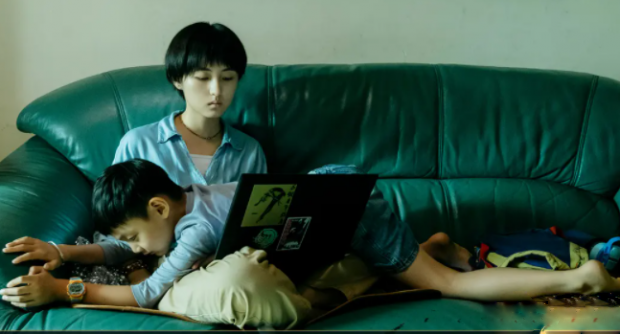The movie "Sister" grossed over 400 million at the box office, many people were moved!
This is another movie after "Hello Mum", that uses "family love" to eliminate social problems, which is also a pattern common to commercial movies. Maybe I easily tear up, not only was I moved, but I also felt sad.
All films with "women's issues" themes are eventually put in the container of "family love", and blood ties have naturally become "morally right". This is also a cultural shackle that women find difficult to break free from as a result of this arranged fate.
Well, not only women, but men are also poisoned by the "utilitarian" concept of inheriting the family line, and they eventually become "giant babies" who never grow up, which is the most persistent problem in Chinese marriages.
01
A pair of "siblings" are estranged because their parents were in a car accident, compelling the elder sister An Ran to face the choice between self-realization (attending graduate school in Beijing) and taking care of her 5-year-old brother. This is a realistic drama touching on the social problems of "male favoritism" and "second child", and also a "tear-jerking" emotional drama.
"Family love" is more than everything, no matter how sharp the "gender issue" is, it will return to the traditional emotional mode. However, how is the audience made to feel more "empathy"? That is, the elder sister who was insulted and deprived of childhood finally reconciled with herself and the past and chose "brotherly love".
Given the parents had left, the relationship between sister and brother could be restored because of responsibility and blood ties. The reason why Confucian ethics constructed by blood ties is so powerful is that it has been internalized into the ethical concept of the Chinese people. Although many people will complain and resist, in the end, they will unconsciously make choices. The so-called "conforming to fate" is living according to cultural customs.
02
In the film, An Ran's aunt was also an "elder sister". She was admitted to a famous university, while her brother was admitted to a technical secondary school. Their family could only afford to sponsor one child in school, so she gave up the chance to attend university for her brother. We can say that the family's resources were limited and skewed towards the male child, but when her younger brother had children, her mother asked her to give up her thriving career and go home to take care of her younger brother's children, which was a bit "over the line". It is clear that girls do not exist as independent individuals, but as "functional" members of the family. However, will the younger brothers protected by the family grow up to be accountable and responsible? They will only reproduce the same ideas in the next generation.
When An Ran was a girl, for her parents to give birth to a boy, she had to dress up as a disabled person. She was not only deprived of all the care, but her father altered her college entrance examination choice to make her take proper care of her younger brother. This kind of "utilitarian birth" and growth without love can only lead to bitterness and resentment. Parents raise boys not to love, but to carry on the family line. People are tools rather than ends, which is the toxin of this culture; and if women are unable to wake up and grow out of the shackles of this culture, they will also replicate this concept in the next generation.
Both An Ran's aunt and An Ran who swore to escape the fate of the previous generation, all fell into the trap of fate. Their lives had been arranged by the family, just living passively based on others' initiatives.
03
"Exalting blood ties" is no way out, because this kind of ethical relationship is set up according to the "father-son" rather than the "husband-wife" contractual relationship; therefore, there will be no real equality between "men and women". To break the shackles of blood ties and let "brotherly love" return to nature and equality, we need to break this kind of moral kidnapping and return to the source of love.
It is only to different degrees that An Ran is also influenced by these kind of cultural ethics. Therefore, I can understand the unfairness that An Ran, as a "sister", encounters. Parents do not educate boys to take more responsibility and protect women, but teach them to be taken care of by women in their families. How can such a man take care of his wife when he is married?
In the pursuit of commercial profits, movies often turn serious problems into sensational "tear gas".
But obviously, it is unrealistic to reflect on family ethics through films and television works. It is said that the original story of the film is even crueler. The elder sister sold her parents' house and abandoned her younger brother.
A few years ago, I read a very challenging passage in the Bible. It seemed as if He "neglected" his mother and brothers. It is He who extends the family relationship from blood relationship to a community of values, which is the way to achieve brotherhood without any family bond.
While Jesus was still talking to the crowd, his mother and brothers stood outside, wanting to speak to him. Someone told him, “Your mother and brothers are standing outside, wanting to speak to you.”
He replied to him, “Who is my mother, and who are my brothers?” Pointing to his disciples, he said, “Here are my mother and my brothers. For whoever does the will of my Father in heaven is my brother and sister and mother.” (Matthew 12:46-50)
A relationship can be made stable only by transcending blood ties and building on truth and values. That explains why Western societies can achieve "universal love". They can adopt children from other countries and take care of orphans and sick children, rather than regard blood ties as the highest standard.
Without love and justice, it is just arranged, which can easily lead to resentment within the family and between people. Even if they are moved for a short time, it will be difficult to persist.
- Translated by Nonye Nancy
(This article was originally published in the "Manhua freedom" WeChat account; CCD reprinted with permission.)












